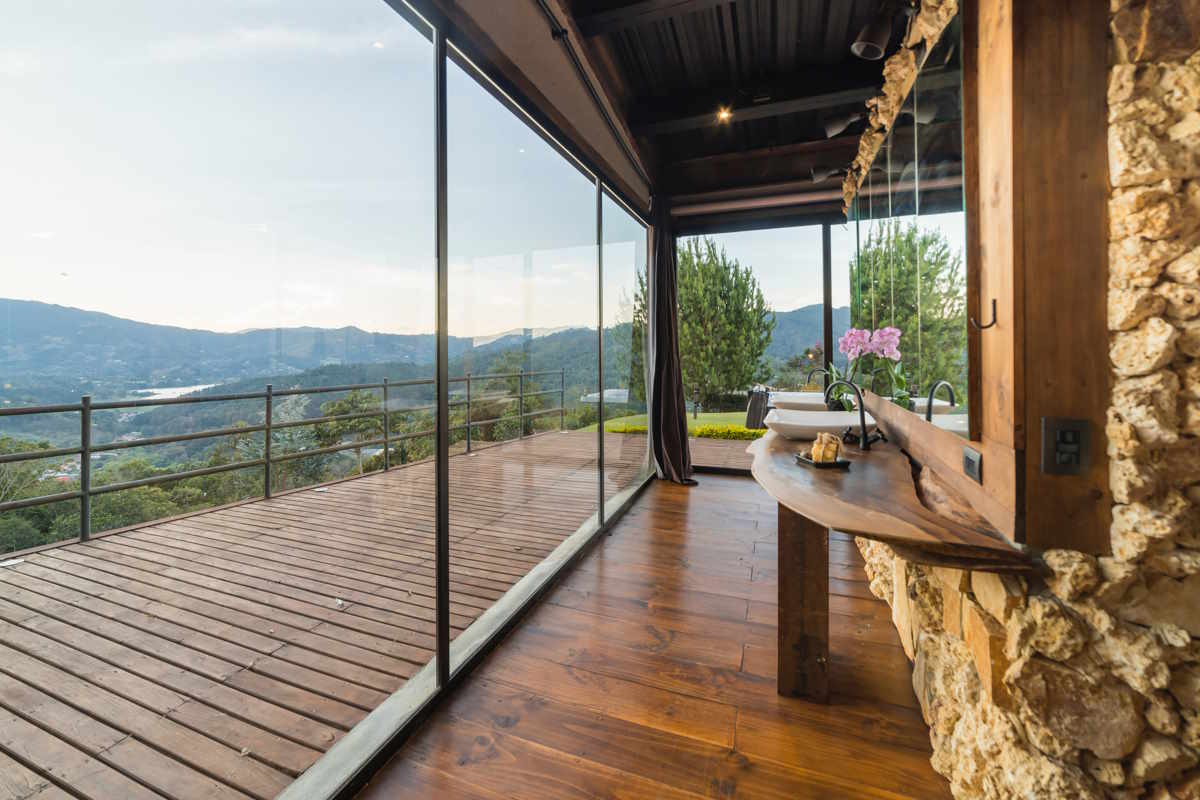Whether you live in a high-rise apartment block yourself, want to visit friends, or are looking to plan your next holiday, there are plenty of occasions when you might find yourself on a balcony. However, if you have a fear of heights, the prospect of even stepping onto a balcony can leave you scared stiff.
Experiencing a fear of heights on balconies can prevent you from enjoying great views and much-needed outdoor space. Fortunately, Climb Above Fear is here to help you to feel at ease. In this quick guide, we’ll talk about the reasons behind the phobia and provide some tips you can use to leave the jitters behind and start enjoying balconies again.
Why do I feel scared on balconies?
To understand the reasons why you feel uncomfortable on a balcony, it helps to know more about the causes of a fear of heights. This phobia—also known as acrophobia—may either be:
- Innate — in other words, it is the result of genetics. Potential causes include trauma experienced by previous generations, our own physiology, or a combination of different genes.
- Learned — a fear that we pick up by navigating the world around us. We may become afraid of heights as a result of experiencing a fall ourselves, witnessing or hearing about an accident, or just by knowing other people with acrophobia.
Acrophobia can develop at any time, and while it is more likely to begin in childhood or adolescence, it can also arise for the first time in older adults. As such, you may find yourself experiencing a fear of heights on a balcony even if you haven’t previously had to deal with this phobia.
Is it definitely acrophobia?

It might surprise you to learn that many people who feel ill-at-ease on a balcony don’t actually have a fear of heights. Instead, they may be experiencing height vertigo.
While many people think that acrophobia and vertigo are the same thing, vertigo is a symptom that can arise due to a variety of reasons. Most commonly, the dizzying, spinning sensation is due to your brain struggling to process its surroundings.
Vertigo and a fear of heights can, of course, go hand-in-hand. Acrophobia sufferers may experience vertigo as a symptom—or, conversely, those who experience vertigo regularly in high places may learn to fear and avoid them.
The ‘call of the void’
One particularly fascinating phenomenon that many people experience is known as the ‘call of the void’. This is where people in a high place, such as a balcony, think about jumping off. This isn’t because they want to jump, and they don’t actually go on to do so.
While it’s difficult to ascertain exactly why people have these kinds of thoughts, some researchers theorise that it could—somewhat paradoxically—be a survival tactic.
In short, when you take a reflex action in a high place, your brain tries to rationalise why you did so. When it realises that you aren’t in any actual danger, it concludes that you must have been about to put yourself in danger by jumping, and that it took action to stop you. To learn more, visit All That’s Interesting.
How to manage a fear of heights on balconies
If you experience any of the symptoms of acrophobia while on balconies, it can be tempting to avoid them altogether. However, doing so actually reinforces your fear. Over time, this may cause your phobia to worsen, making it harder to overcome in the future. That’s why it’s best to tackle your fear head-on.
Below, we’ll detail some of the ways you can manage your fear of heights, helping you to enjoy your time on balconies.
1. Safety first
Whilst acrophobia can make you overestimate the potential for danger, the reality is that there is a risk of accidents happening on a balcony. Almost all of this, however, can easily be managed by following some simple safety tips.
- Remove any possible trip hazards from your balcony.
- Don’t lean over the edge of a balcony, or lean against the wall or railings.
- Never stand on top of any balcony furniture, such as chairs or tables.
- Avoid crowding onto a balcony.
- Don’t climb from one balcony to the next.
- Ensure that children and pets are supervised at all times.
For more helpful advice, visit ABTA’s balcony safety article.
2. Keep yourself grounded
If you find yourself overwhelmed by feelings of fear and anxiety, then it can be helpful to try grounding yourself. This can be achieved using a variety of techniques, all of which aim to divert your mind’s attention from negative emotions and back towards the present moment.
One popular grounding technique is known as 5-4-3-2-1, which is linked to the concept of mindfulness. It involves taking the time to notice five things you can see, four things you can touch, three things you can hear, two things you can smell, and one thing you can taste. In doing so, you engage all of your senses.
Other forms of grounding involve distracting your mind from fear. Common ways of doing this include simple mental maths, such as counting backwards from 100, or naming things that fit into a certain category.

3. Just breathe
As well as the grounding techniques detailed above, you can help to calm yourself while on a balcony using breathing exercises. These work to reduce feelings of stress by slowing your heart rate, lowering your blood pressure, and reducing the levels of stress hormones present in your bloodstream.
The best part is that breathing exercises are typically easy both to remember and to practise. Take box breathing, for example, which includes exhaling for four seconds, holding for four, inhaling for four seconds, and finally holding for another four.
Any technique that you choose will focus on encouraging you to breathe deeply, rather than the shallow, rapid breathing associated with fear. As such, any deep breathing exercise can be highly effective at relieving feelings of anxiety in the moment—so, try a few and see which works best for you.
4. Counter negative thoughts
Being on a balcony—or even the idea of it—can be enough to trigger acrophobia. When this happens, negative thoughts can quickly begin swirling around your head. This could include anything from imagining all of the possible worst-case scenarios to putting yourself down for feeling afraid.
When you catch yourself going down this pathway, taking a moment to stop, reflect, and reframe your thoughts can be a game-changer. The key is not to replace hopeless negativity with fake positivity, but instead to be realistic. For example, if you find yourself thinking that you’re about to fall, remind yourself that people go onto balconies all the time perfectly safely.
Similarly, if you do find yourself struggling, be kind to yourself. Imagine, for example, that you manage to stand on a balcony, but can’t bring yourself to go right to the edge. Instead of criticising yourself, focus on the progress that you have made in combatting your fear and how far you’ve already come.
5. Get professional acrophobia help
If you find that acrophobia is taking a toll on your life that can’t easily be remedied using self-help techniques, then it may be time to consider turning to a professional. This is particularly true if you have a balcony in your own apartment that you feel too scared to use.
By turning to a therapist, you could explore a range of approaches that aim to help you to overcome your fear. Examples include exposure therapy, which sees you slowly acclimatise yourself to high places, or CBT, which works on changing your thought processes.
Fear of heights on balconies: summary

If acrophobia is preventing you from enjoying balconies at home or abroad, then there are steps you can take to change things. For many people, self-help techniques such as the ones listed in this article are sufficient. However, if a fear of heights is becoming a pervasive issue in your life, then it may be beneficial to get help from a licensed therapist.
If you’re considering therapy, then be sure to look into the Climb Above Fear acrophobia course. This will see you work alongside one of our phobia therapists, exploring the root causes of your fear and learning how to deal with symptoms as they arise.



